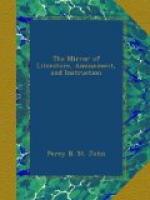The monarch triumphed. Conqueror of the Kurdes, the Georgians, the Turks, and the Afghans, he re-entered Ispahan in triumph. He had already made it the capital of his dominions, and now proposed to himself to enjoy there quietly, in the midst of his glory, the fruits of his vast conquests; but the heart of the ambitious can never know repose. The grandeur of the sovereign crushed the people; Abbas felt this; he knew that, though powerful, he was detested; he trembled even in the inmost recesses of his palace. In pursuance of the Oriental policy which has of late years been introduced into Europe, he resolved to give a diversion to the general hatred, which, in concentrating itself towards a single point, endangered the safety of his throne. With this design, he established, in the principal towns, numerous colonies from the nations he had conquered, and gave them privileges which excited the jealousy of the original inhabitants. The nation immediately divided into two powerful factions, the one calling itself the Polenks, the other the Felenks party. Abbas took care to keep up their strength; by alternately exciting and moderating their violence, he distracted their attention from the affairs of government. The disputes between them sometimes looked very serious; but they were kept under until the festival of the birthday of the Schah; on that occasion, the contenders were at last permitted to show their joy by a general fight. Armed with sticks and stones, they strewed the streets with bodies of the dying and the dead. Then the royal troops suddenly appeared, and proclaimed the day’s amusements at an end, with slashes of the sabres drove back the Polenks and the Felenks to their homes.
But no sooner had this great politician ceased to fear his people, than he began first to dread his court, and next, his own family. Of his three sons, two had, by his command, been deprived of sight. By the laws of Persia, they were consequently declared incapable of reigning, and imprisoned in the castle of Alamuth.[6] He had only one now remaining. This was the noble and generous Safi Mirza—the delight of his father, and the hope of the people. His brilliant qualities, however, were destined only to be his destruction.
Abbas was one day musing, with some uneasiness, on the valour and popular virtues of his son, when the young prince suddenly appeared. He threw himself at his father’s feet. He presented him a note which he had just received, and in which, without discovering their names, the nobles of the kingdom declared their weariness of his tyranny. They proposed to the youth to ascend the throne, and undertook to clear his way to it. Safi Mirza, indignant at a project which tended to turn him into a parricide, declared all to the Sebah, and placed himself entirely at his disposal. Abbas embraced him, covered him with caresses, and felt his affection for him increase; but, from that moment, his fears redoubled. His anxiety even prevented him from sleeping. In order to get at the conspirators, he caused numbers of really innocent persons to die in tortures; and, feeling that every execution rendered him still more odious, he feared that his son would be again solicited, and would not again have virtue to resist.




